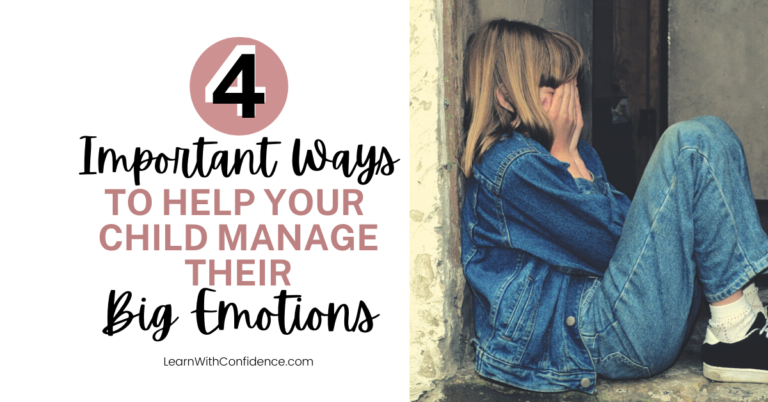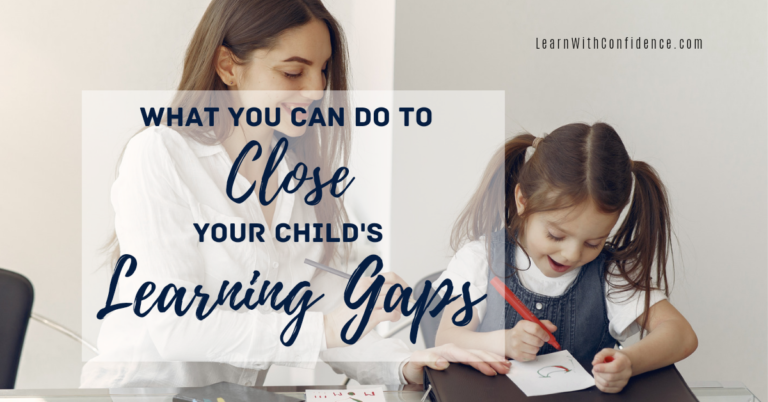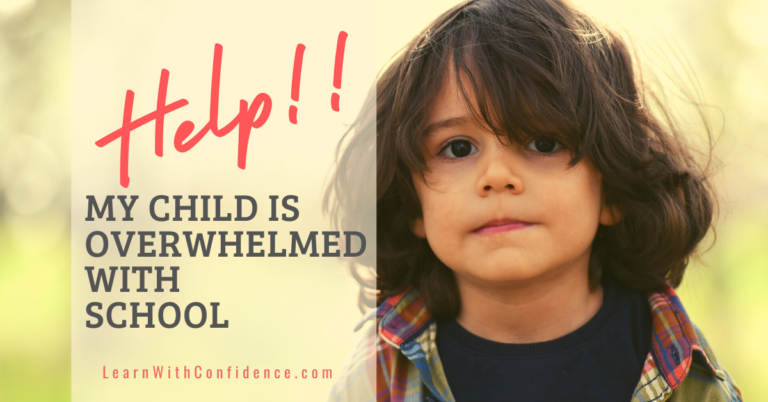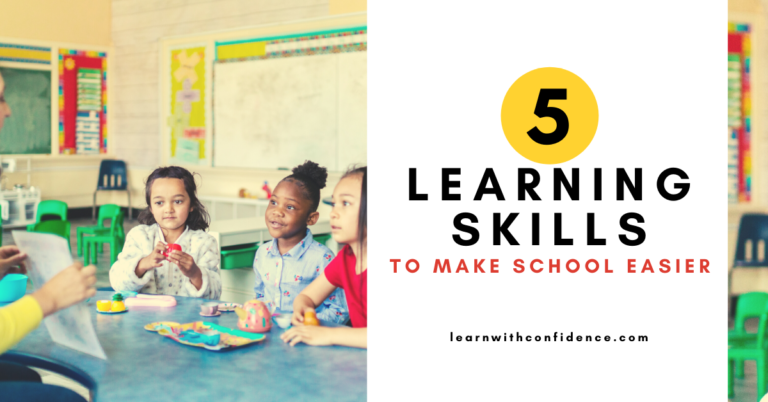Want strong, resilient kids? Develop their social and emotional skills.
Strong and resilient kids can face challenges and respond in healthy ways because they are equipped with the social and emotional skills they need. Developing these 4 social emotional skills will help your child to stand strong and overcome when they face all of the challenges life throws at them. And you, Mama, are the best person to teach them!
I just spoke to a mom about her child who is feeling overwhelmed as she starts a new school year. The pace and amount of work has increased. Her child is expected to keep track of all of her books as she moves from class to class. She has to remember to write down her own homework and keep track of due dates and assignments.
And not only that, but as she’s getting older, friendships are changing and the things that seemed so easy have become more challenging. Her grades have taken a real dip and she’s feeling anxious and stressed out.
She’s struggling with her own sense of identity and her relationships with her friends as well as trying to cope in school and achieve the results she used to achieve.
Maybe your child is feeling the same way?
As moms, one of our greatest tasks is to equip our children with the tools they need to cope with all the challenges life will throw at them.
And they will have challenges. That’s a given. No matter how much we want to protect them.
So how do we make them strong enough to cope with an overwhelming school workload, rejection from a friend or questioning their sense of who they are because they didn’t achieve that A they’re used to getting?
We develop their social and emotional skills.
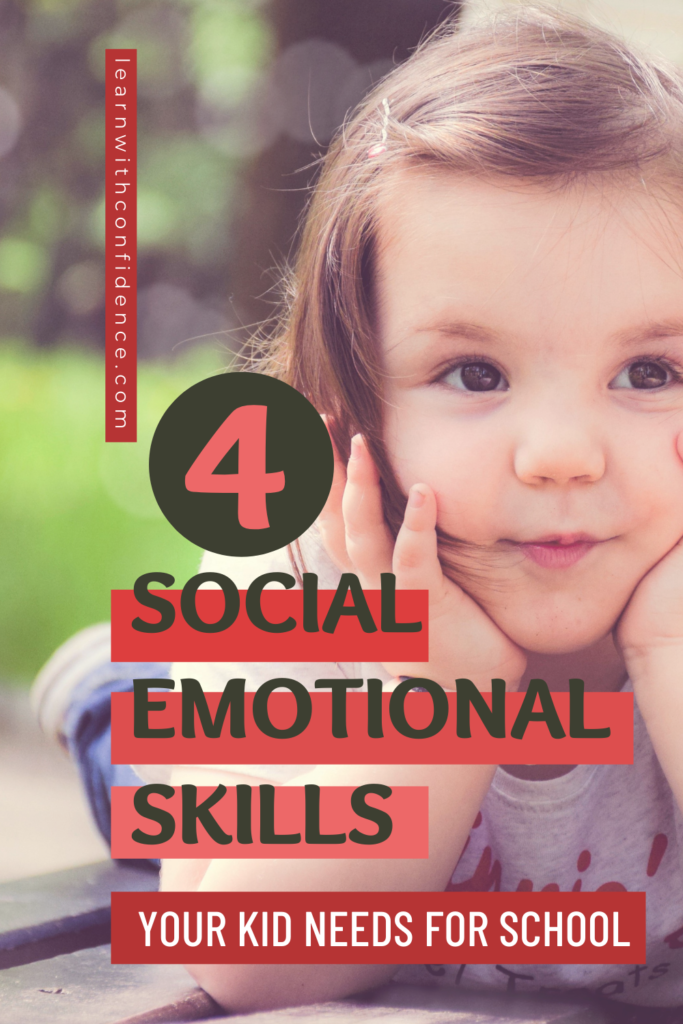
Why developing social emotional skills is so important for strong and resilient kids.
Social emotional skills are so foundational to so many areas of your child’s life and learning. Developing a healthy sense of self and healthy social interactions with others is how our children survive and thrive; how they enjoy success in school and in life beyond it.
Building a strong sense of self
Your child’s sense of identity, their self-esteem and the values they hold, govern the way they handle every challenge that comes across their path. Developing this obviously starts from the day they’re born and progresses through lots of different stages as they grow older.
What we teach our children about how they came to be, and who they are, what they believe in and the values we hold as a family – and how we teach them this – is the cornerstone on which everything else is built.
Developing great social skills
A child who is secure in their identity and has a strong sense of themselves, interacts very differently with those around them. A child is more sure of themselves is able to tackle challenges very differently too. We are social beings and our children will have to navigate a number of different social situations. Developing great social skills is crucial to their success.
(Quick disclaimer though, if I may: It is 100% normal for your child to go through stages when they do question their identity and where they struggle with it, even when we do everything to give them a strong sense of self. It’s our job to support them and guide them as they navigate these waters.)
Social and Emotional skills can be learned
The most wonderful part of all of this is that these social emotional skills are just that, “skills”. And because that’s the case, they can be learned, practiced and mastered.
But your child needs someone to teach them, to guide their learning, to coach them as they practice those skills.
And that, Mama, is your role!
(Did you know reading is an AMAZING way to develop your child’s social and emotional skills. Check out this FREE resource to help you get started!)
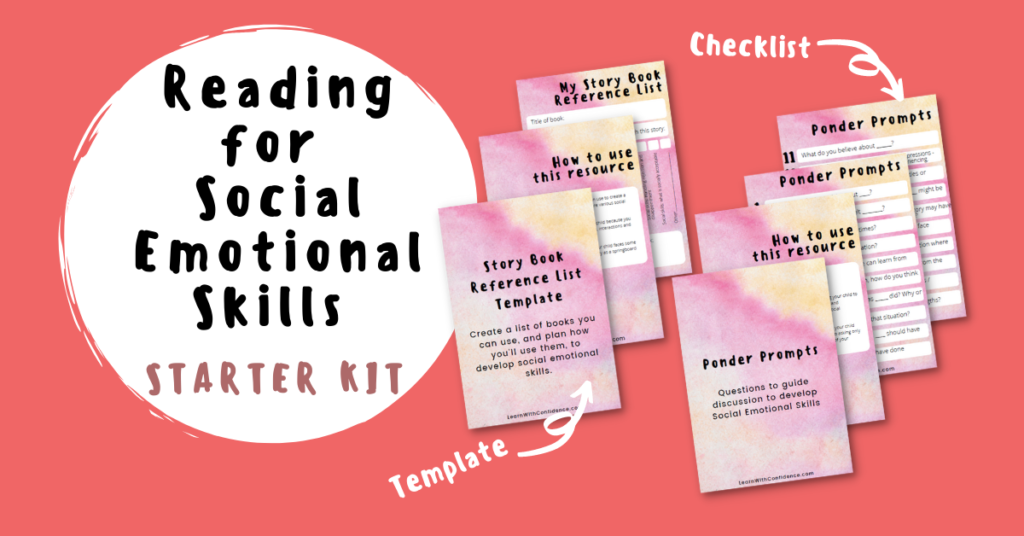
What social emotional skills can we develop to make our children strong and resilient?
There are 4 main social and emotional skills your child needs to learn, practice and master, that will help them become stronger and more resilient. They are closely connected so as you see improvements in one area, you’ll also see changes in other areas.
Self-awareness
Self-awareness is exactly what it sounds like: Being aware of yourself.
How self-awareness develops
Your child was developing the basics of this back when they were a baby, every time that hungry little tummy grumbled, they knew they needed Mama to feed them. And when they were a toddler and they started potty training. They had to become aware of when that sudden physical urge that needed taking care of.
These were the beginnings of self-awareness. As they grow older, they’re going to need to become more aware of their inner world. Their thoughts, their feelings, how they act or react in response to different things. They also need to become aware of what makes them unique, their strengths, the things they find challenging.
Self-aware children are strong, resilient kids.
As your child faces challenges, they will have different feelings and respond in different ways. They will have to make decisions about how to react, what action to take and which path to walk. Self-aware children are able to do this a lot easier because they are aware of their thoughts and feelings and they can make better choices from this place.
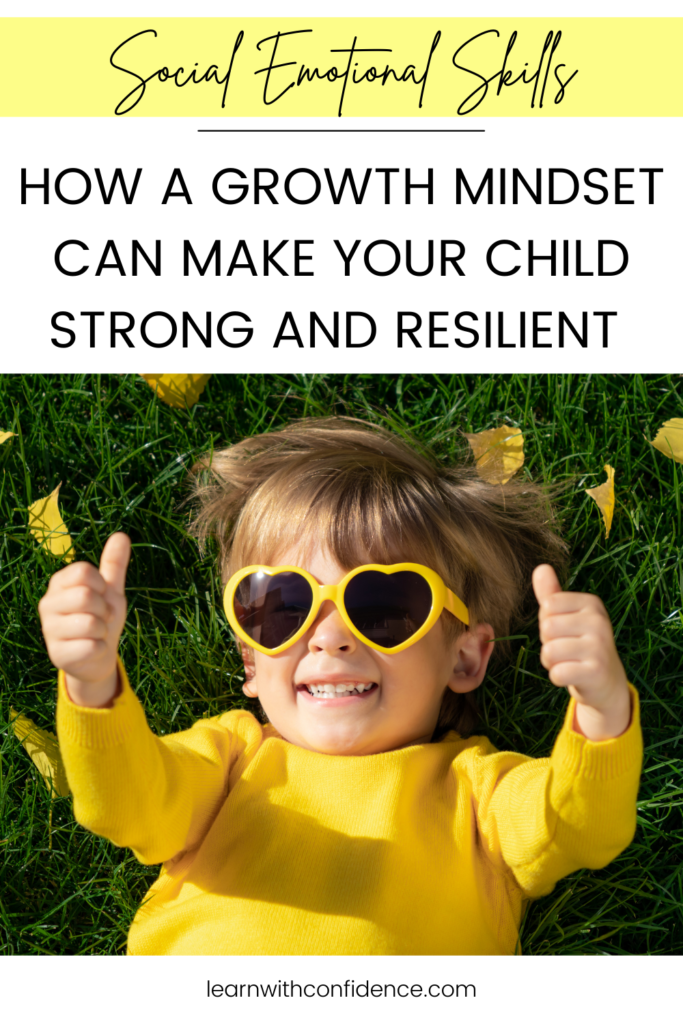
Growth mindset
The second social emotional skill that makes strong and resilient kids is developing a growth mindset.
Choose a growth mindset rather than a fixed mindset.
Understanding that you are not a fixed being can be a powerful thing. So often our children have a “fixed mindset” about themselves, their abilities and their circumstances.
- I can’t do Maths.
- I’m not good at that.
- I’ll never be able to ____.
- That teacher hates me. I’ll never do well in her class.
And some of that comes from us, Mama. Ever said something like this: “I was never good at Math so my child struggles with it too.” “I’m always late! We can just never be on time.”
That fixed mindset says “I am who I am and I’ll never get better or change.” You can see how that may be problematic, not to mention completely untrue!
A growth mindset will make your child strong and resilient.
But here’s the thing: We are designed to adapt.
So having a growth mindset helps your child acknowledge that they have the potential to grow, to learn new things, to improve. They have the ability to leverage their strengths to overcome, or mitigate their challenges. They recognize that challenges are important opportunities to grow and improve.
That’s the voice of a strong and resilient child.
Managing your own emotions
Before a child can manage their emotions they need to be aware of them. That’s why self-awareness is so important. And teaching our children to manage their emotions starts with acknowledging them and being okay with feeling them.
Managing emotions starts with being ok with feeling them
It’s ok to feel. To feel happy. And to feel sad. To feel disappointed or mad or ecstatic. We’re made to feel emotions. All of the emotions.
When your child needs to manage their emotions they need to
- Name what they’re feeling and describe to what degree they’re feeling it.
- Identify what triggered this feeling in them
- Recognize how they usually react or respond in those moments
- Explore healthy ways of responding when their “negative” or “big” emotions are triggered.
Teaching your child to manage their emotions starts from when they’re babies and they’re depending completely on you to regulate their emotions. Later, as they grow a little older, they need you to co-regulate with them and teach them how to regulate their own emotions for those times when they’re older and mom isn’t around.
Strong, resilient kids can identify what they feel and manage their reactions.
With every challenge, your child will feel emotions. If they know what they’re feeling and how they can best respond, they will be able to handle the situation with strength and resilience.
Social skills
When our children know themselves better, they can interact with others more effectively. If they can manage their own emotions, they can handle situations that trigger those strong feelings and know how to respond better.
We have to equip our children to interact effectively on a social level.
This starts, as do all the skills, when they’re babies. Even while they’re even developing in the womb, they’re encountering social interactions – though they’re not consciously aware of it. And the moment they enter the world, their bubble of social interactions starts growing.
As you interact with your child, as they watch you interact with your spouse and other children, as they interact with siblings and grandparents and friends and teachers, they are learning from every interaction. They’re learning how to manage conflict and differences. They learn what is socially acceptable and what is not in that particular culture and context. They learn about making friends and maintaining those friendships.
Most of this is “caught”, rather than “taught”. But we can be intentional about teaching these skills to our children so they can be equipped in every situation possible.
Social skills help make your child strong and resilient
Think of the things you often find most challenging. There is almost always a social element to it, isn’t there. Whether its a challenging client or making a decision that involves other people, how we deal with the situation will have an impact on our social interactions as well.
It’s the same for our children. They may be struggling with Math, but don’t feel comfortable approaching the teacher for help. They might be having trouble excelling in their team sport, and it’s because they can’t see eye-to-eye with another player on their team. Strong social skills are going to aid in all of these situations.
Does your child have the social emotional skills they need to be strong and resilient?
Think back to my original story, and maybe even to where your child is at today.
What kind of skills does your child need to work on? Maybe they need to be more aware of their emotions, thoughts and actions. Perhaps they are stuck in a fixed mindset where they believe they can’t succeed and they’ll never manage all these overwhelming circumstances. Or maybe they need to learn some more healthy ways of managing their emotions because either they lash out too easily or they just crumble. Maybe they need some extra social skills to help them interact confidently and in a healthy way with others, while asserting themselves and thinking of the other person.
All of these are things you can teach them, practice with them and coach them through, Mama.
And I’m here to help you do that. Because maybe you feel out of your depth when it comes to equipping your child with these skills too. Ultimately, you remain the best person for the job – You’ve been doing it from before they were even born!
Save and Share this Post
Pin this image to your favorite board on Pinterest and share it with your momma friends who want their children to be strong and resilient too.

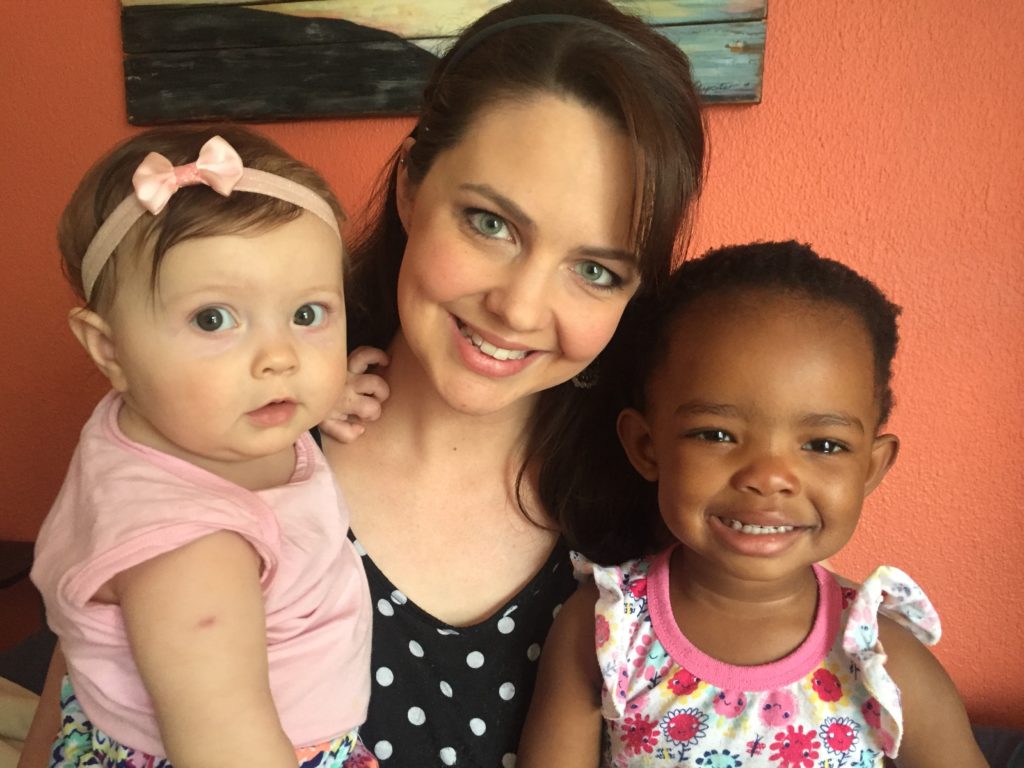
I would love to connect with you and include you in this community of Mommies as we support each other and grow together to become the best moms we can be!
Get on my emailing list here and I’ll make sure I keep you in the loop on all the latest blog posts, freebies and resources!


